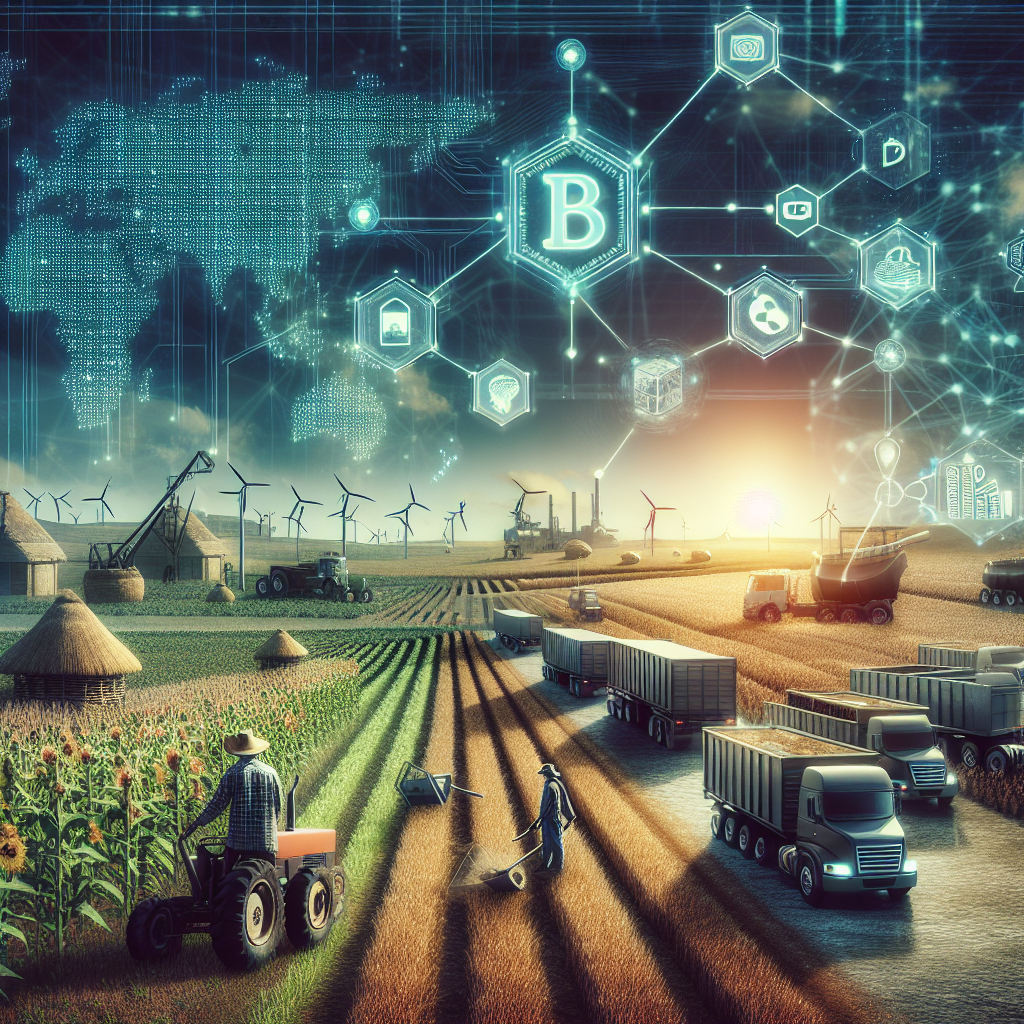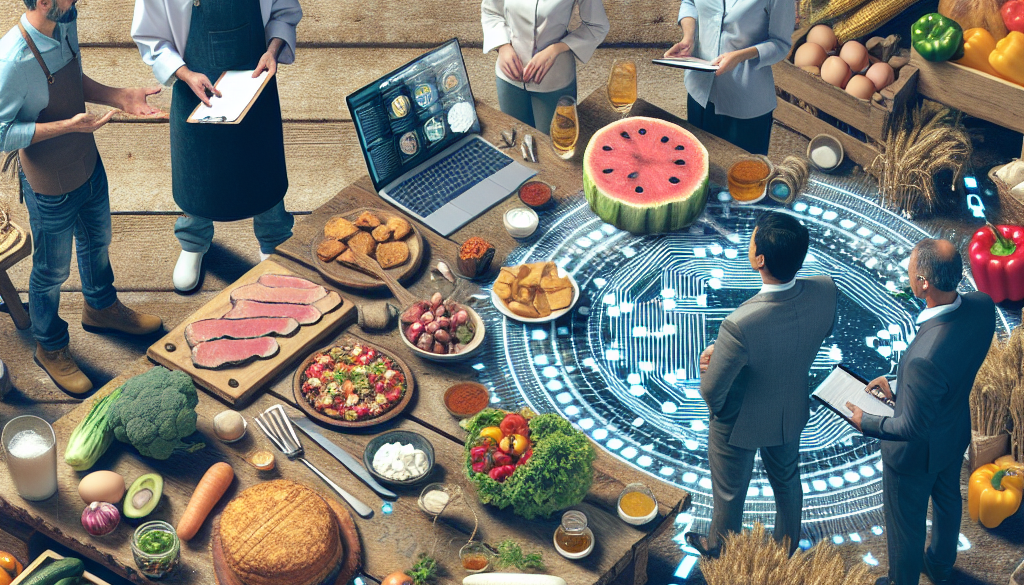Blockchain Transforming the Food and Beverage Industry: How?
-
Table of Contents
- Blockchain Revolutionizing the Food and Beverage Industry: Insights and Impacts
- Enhancing Traceability and Transparency
- Improving Food Safety
- Streamlining Operations and Reducing Costs
- Case Studies and Statistics
- Challenges and Considerations
- Conclusion: The Future of Food and Beverage with Blockchain
- Discover ETprotein’s High-Quality Protein Products
Blockchain Revolutionizing the Food and Beverage Industry: Insights and Impacts

The food and beverage industry is undergoing a significant transformation, thanks to the advent of blockchain technology. This decentralized digital ledger is best known for underpinning cryptocurrencies like Bitcoin, but its potential extends far beyond the realm of finance. In the food and beverage sector, blockchain is emerging as a powerful tool for enhancing transparency, improving food safety, and streamlining supply chains. This article delves into the various ways blockchain is reshaping the industry and the benefits it brings to producers, retailers, and consumers alike.
Enhancing Traceability and Transparency
One of the most significant impacts of blockchain on the food and beverage industry is the enhancement of traceability and transparency. With blockchain, every transaction or movement of a product can be recorded and verified, creating an immutable record from farm to table.
- Supply Chain Visibility: Blockchain technology allows for real-time tracking of products as they move through the supply chain. This means that at any given moment, stakeholders can know exactly where a product is and how it got there.
- Preventing Food Fraud: The immutable nature of blockchain records helps prevent food fraud by making it nearly impossible to tamper with product histories. This is particularly important for high-value items like organic produce or fair-trade coffee.
- Recall Efficiency: In the event of a food safety issue, blockchain can pinpoint the affected products quickly and accurately, enabling more efficient recalls and reducing the risk of widespread contamination.
Improving Food Safety
Blockchain’s ability to provide a transparent and unalterable record of food products’ journey from source to consumer significantly enhances food safety measures.
- Reducing Contamination: By tracking the handling and storage conditions of food items, blockchain can help identify potential points of contamination, leading to quicker corrective actions.
- Regulatory Compliance: Blockchain can assist businesses in maintaining compliance with food safety regulations by providing auditors with clear and accessible records of their supply chains.
- Consumer Confidence: Access to a product’s history can increase consumer trust, as they can verify the authenticity and safety of their food purchases.
Streamlining Operations and Reducing Costs
Blockchain can significantly streamline operations within the food and beverage industry, leading to cost reductions and increased efficiency.
- Automated Transactions: Smart contracts, which are self-executing contracts with the terms directly written into code, can automate payments and other transactions, reducing the need for intermediaries.
- Inventory Management: Real-time tracking can lead to more accurate inventory management, reducing waste and ensuring that supply meets demand more effectively.
- Reduced Paperwork: Blockchain’s digital ledger can replace much of the paperwork involved in food and beverage logistics, saving time and reducing errors.
Case Studies and Statistics
Several companies in the food and beverage industry have already begun to implement blockchain technology with promising results.
- Walmart’s Food Traceability Initiative: Walmart has partnered with IBM to use blockchain to track the origin of over 25 products from 5 different suppliers. This initiative has reportedly reduced the time it takes to trace the origin of food from 7 days to just 2.2 seconds.
- Carrefour’s Quality Line Chicken: French retailer Carrefour uses blockchain to provide customers with detailed information on their Quality Line chicken products, including information on the hatchery, the farm where the chicken was raised, what the chicken was fed, and how it was processed.
Challenges and Considerations
Despite its potential, blockchain adoption in the food and beverage industry faces several challenges.
- Technology Integration: Integrating blockchain with existing systems and processes can be complex and costly.
- Data Privacy: Ensuring the privacy of sensitive data within the blockchain is a concern that must be addressed.
- Standardization: The lack of industry-wide standards for blockchain applications can hinder interoperability and widespread adoption.
Conclusion: The Future of Food and Beverage with Blockchain
Blockchain technology holds the promise of a more transparent, safe, and efficient food and beverage industry. By providing an immutable record of a product’s journey, blockchain can enhance traceability, improve food safety, and streamline operations. While challenges remain, the potential benefits are significant, and early adopters are already seeing positive results. As the technology matures and industry standards emerge, blockchain is poised to become an integral part of the food and beverage supply chain.
Discover ETprotein’s High-Quality Protein Products
In line with the advancements in the food and beverage industry, ETprotein offers a range of high-quality protein products that cater to the evolving needs of consumers. Their organic bulk vegan proteins and L-(+)-Ergothioneine (EGT) are produced with the highest standards, ensuring that they meet the demands of a market that values transparency and quality.
ETprotein’s offerings are ideal for businesses looking to enhance their product lines with ingredients that are not only sourced responsibly but also align with the technological advancements in food traceability and safety. By choosing ETprotein, companies can assure their customers of the integrity and quality of their products, backed by the reliability of blockchain’s tracking capabilities.
About ETprotein:
ETprotein, a reputable protein and L-(+)-Ergothioneine (EGT) Chinese factory manufacturer and supplier, is renowned for producing, stocking, exporting, and delivering the highest quality organic bulk vegan proteins and L-(+)-Ergothioneine. They include Organic rice protein, clear rice protein, pea protein, clear pea protein, watermelon seed protein, pumpkin seed protein, sunflower seed protein, mung bean protein, peanut protein, and L-(+)-Ergothioneine EGT Pharmaceutical grade, L-(+)-Ergothioneine EGT food grade, L-(+)-Ergothioneine EGT cosmetic grade, L-(+)-Ergothioneine EGT reference grade and L-(+)-Ergothioneine EGT standard. Their offerings, characterized by a neutral taste, non-GMO, allergen-free attributes, with L-(+)-Ergothioneine purity over 98%, 99%, cater to a diverse range of industries. They serve nutraceutical, pharmaceutical, cosmeceutical, veterinary, as well as food and beverage finished product distributors, traders, and manufacturers across Europe, USA, Canada, Australia, Thailand, Japan, Korea, Brazil, and Chile, among others.
ETprotein specialization includes exporting and delivering tailor-made protein powder and finished nutritional supplements. Their extensive product range covers sectors like Food and Beverage, Sports Nutrition, Weight Management, Dietary Supplements, Health and Wellness Products, and Infant Formula, ensuring comprehensive solutions to meet all your protein needs.
As a trusted company by leading global food and beverage brands and Fortune 500 companies, ETprotein reinforces China’s reputation in the global arena. For more information or to sample their products, please contact them and email sales(at)ETprotein.com today.












